Papers by Dalibor Jovanovski
He was exploring the local archaeological past, tradition of the population, analyzing the politi... more He was exploring the local archaeological past, tradition of the population, analyzing the political and social situation. Evans became a famous archaeologist with his excavations and findings in Crete. He did not avoid the chance to write a lot of articles and books about the region from archaeology to politics. He engaged himself to inform and to influence the British public opinion in regard of the Balkans affairs. Evans took participation in the establishing various organization related to the Balkan matters with political, humanitarian and social aims. He was a member of the London Balkan Committee, the Macedonian Relief Fund, the Serbian Relief Fund, the Serbian Society in Great Britain. He supported the activities of the Yugoslav Committee in London. His books and articles were valuable sources for the British diplomacy.
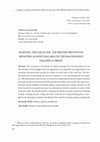
The occurrence and spread of malaria amongst the warring parties on the Macedonian 1 front brough... more The occurrence and spread of malaria amongst the warring parties on the Macedonian 1 front brought about the appearance of completely new approaches in its treatment and prevention among the solders on both sides of the front line. The British experience in preventing the spread of malaria is a very interesting topic for analysis. The Macedonian front became an enormous experimental field for malaria research and experiments carried out by British medical and military personnel. The impact malaria had on the readiness of British soldiers concerning their combat activities on the front forced the command structures to undertake preventive measures in order to halt its spread. Thus, the British military command in Salonica became involved in draining swamps, clearing streams, oiling, and other methods of treating breeding places, fumigation and spraying, mosquito-proofing the huts and the carrying quinine prophylaxis.
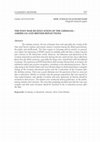
The military actions, the loss of human lives and especially the cruelty of the Nazi and Fascist ... more The military actions, the loss of human lives and especially the cruelty of the Nazi and Fascist regimes and armies caused a reaction among the allied governments, the public and intellectuals. The Nazi regime in Germany and its actions, in general, even before the beginning of WWII caused an initially mild and later a sharp reaction and criticism in the democratic world. However, the behaviour and fanaticism of the German armed forces and their atrocities during the war could not but cause reflections about how the allied countries, especially the larger ones, should deal with the defeated Germany. The experience of WWI had shown that German Nazism had, as its basis, the militarism which was present everywhere, including in the educational process. That is why many in the United States and Great Britain began to think aloud about a complete change of the German educational system and the re-education of the Germans after the military victory. There was a great dilemma over the questions of how to carry out that re-education, whether to include only the younger population that was exposed to Nazi indoctrination, and whether Germans who were opponents of Nazism should be included in that process. The debates were conducted among politicians, in the public, among scholars and scientists. The view that gradually prevailed was that the issue was complex and that some Germans should be involved in the re-education process after the War.
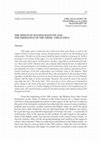
This paper aims to show how the Greek Great Idea came about, as well as the impact it had on Gree... more This paper aims to show how the Greek Great Idea came about, as well as the impact it had on Greek society, science, foreign policy, as well as on the building up of nationalism. The full text of the speech made by Ioannis Kolettis on January 14, 1844 is provided in one section of this paper. It is our belief that it should be published for the sake of the past, the present, and the future. Kolettis, originally an Aromanian from Epirus, then a part of the Ottoman state, was a highly influential politician in independent Greece. He participated in the building of the institutions of the new state. His speech was allegedly not meant to inflame Greek nationalism and reinforce aspirations for territorial expansion of the first independent and Orthodox state in the Balkans. What Kolettis wanted to get across was that all those who participated in the uprising of 1821, regardless of whether they were born in the territory of the new state or in the Ottoman Empire, had the right to Greek citizenship. However, the words he used in the speech, especially the term "The Great Idea" (Μεγάλη ιδέα), led to a flare-up of nationalism and a change in the views of the past, especially on the issue of ancient Macedonia and Byzantium, as well as to a public display of territorial claims to the neighbouring Ottoman state. His speech became a guide for the future foreign and national policy of the Kingdom of Greece.

Сите посветени проучувачи на македонската национална мисла се сложуваат дека Мисирков и Конески с... more Сите посветени проучувачи на македонската национална мисла се сложуваат дека Мисирков и Конески се двата меѓника врзани за стандардизацијата на современиот македонски јазик. Важен е податокот дека и двајцата ги земаат централните говори на западното наречје како основа за современиот стандард. Важно дека и двајцата го избираат фонолошкиот правопис. Сепак се разликуваат во пристапот кон претходната писмена традиција. Конески истакнува дека Мисирков прави еден антитрадициски обид во однос на современиот писмен јазик (неговата стандардизација на македонскиот јазик), бидејќи до крајна можна мера го избира синхронискиот пристап, односно ги избира јазичните форми што ги одликуваат современите граматички состојби. Тој, Конески, смета дека тоа се прави за во максимална можна мера да се издели новиот македонски стандарден јазик од другите јужнословенски јазици. Од друга страна, Конески се залага за еден поумерен пристап во однос на почитувањето на факторот на традицијата во писмениот јазик, т.е. тој заклучува дека делумното почитување на факторот на писмената традиција доведува и до проширување на дијалектната основа на современиот јазичен стандард. Можеме од досега кажаното да заклучиме дека и првата стандардизација на македонскиот јазик од 1903 г., како и конечната стандардизација од 1944/1945 г., не се разликуваат принципиелно, но во овој труд сакаме да ги обработиме и историските и политичките причини зошто првата стандардизација не се етаблирала во тие околности, а зошто конечната стандардизација успеала, колку тоа да изгледа јасно на прв поглед. Се трудиме целиот процес да го разгледаме во регионалниот, но и поширокиот геостратегиски контекст, односно дали тоа што се случувало во развојот и кодификацијата на македонскиот јазик, може да го забележиме и кај другите јазици во регионот, пред сѐ кај
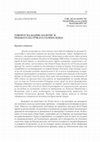
Целта на овој прилог е да се покаже како дојде до појавата на грчката Голема идеја и нејзиното вл... more Целта на овој прилог е да се покаже како дојде до појавата на грчката Голема идеја и нејзиното влијание врз грчкото општество, наука, надворешна политика и засилување на национализмот. Исто така во прилогот е даден целиот текст на говорот на Јоанис Колетис од 14 јануари 1844 година. Сметаме дека тој треба да биде објавен на македонски јазик заради минатото, сегашноста и иднината. Колетис, кој по потекло бил Влав од Епир, тогаш дел од Османлиската Држава, бил мошне влијателен политичар во независна Грција. Тој учествувал во изградбата на институциите на новата држава. Неговиот говор навидум немал за цел да го разгори грчкиот национализам и да ги засили аспирациите за територијално проширување на првата независна и православна држава на Балканот. Целта на Колетис била да укаже дека сите кои учествувале во востанието од 1821 година, без разлика дали биле родени на територијата на новата држава или на онаа на Османлиската Империја имале право на грчко државјанство. Меѓутоа зборовите кои тој ги употребил во говорот, посебно терминот Голема идеја (на грчки Μεγαλη ιδεα), довеле до разгорување на национализмот, промена во погледите на минатото, особено по прашањето на Античка Македонија и Византија, како и јавно истакнување на територијалните претензии кон соседната Османлиска Држава. Неговиот говор станал водилка за идната надворешна и национална политика на Кралството Грција.
Последните неколку децении во регионот актуелно е историското образование и критиката на учебници... more Последните неколку децении во регионот актуелно е историското образование и критиката на учебниците по историја. Македонските учебници не се и не смеат да бидат исклучок од таа критика и дебата. Критика на учебниците по историја може да биде професионална, политичка/политизирана/идеолошка, направена од страна на историчари, но и политичари, како и критика на оние кои се бават со историското образование, а не произлегуваат од нашата фела. Таа може да се однесува на било кое историско образование во регионот и пошироко. Тука ќе се осврнеме на размислувањата и критиката на македонските учебници по историја, објавени по 2005 година.
The main object of this presentation is to show how the term Balkanization appeared and its misus... more The main object of this presentation is to show how the term Balkanization appeared and its misusing during the past decades in common usage of
the word. Mowrer wrote that the meaning of the word “Balkanization” is a
creation for the region hopelessly mixed races of a medley of small states
with more or less backward populations, economically and financially weak,
covetous, afraid, a continual prey to the machination of the Great powers and
to the violent prompting of their own passions.
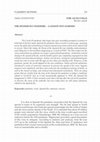
The Covid-19 pandemic that began last year inevitably prompted scientists to look back at the las... more The Covid-19 pandemic that began last year inevitably prompted scientists to look back at the last major Spanish flu pandemic that occurred a century ago, sweeping across the globe and contributing to massive human losses from which some nations had to recover. Much like today, the threat of the Spanish flu was initially underestimated, most likely due to the hostilities happening as a result of WWI. The War ended, but the virus evolved from an epidemic to a major, unprecedented pandemic. Authorities reacted slowly to the spread of the flu, and the health system was completely unprepared to deal with the new and unknown danger. At first, even doctors, virologists, and epidemiologists could not come to terms with the type of virus they were dealing with. However, as the pandemic spread, the world adapted to the new conditions. States and local authorities introduced a series of restrictive measures to prevent the spread of the virus, hygiene measures were tightened, and there were orders for the mandatory wearing of masks, as well as the closure of shops, and cultural and educational institutions. There are many points that are similar from the time of the Spanish flu pandemic to today's conditions related to Covid-19. Just as it had unexpectedly appeared in 1918, the Spanish flu disappeared in 1920. It took scientists more than a decade after the end of the pandemic to discover the cause of the outbreak, but even today there are still many unknowns related to the Spanish flu.
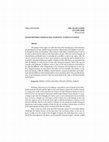
Годишен зборник на Филозофскиот факултет/The Annual of the Faculty of Philosophy in Skopje
The purpose of this paper is to show the role of the common past in the emergence and development... more The purpose of this paper is to show the role of the common past in the emergence and development of some smaller European nations. Shared past in the Balkans is seen solely through the prism of nationalism. When someone talks about a shared history, he does it in order to show that the others in that history have no past. There are several examples of shared history worldwide and it is normally not a problem, except in our region. Also, the role of a person in the past of two or more nations is very common and it should not be a ground for misunderstanding and conflict. Fluidity of ethnic identity is not associated only with the Balkans; it is also present in some other European countries. Such is the case, for example, with Lithuania. In addition, when it comes to the role of reformers and intellectuals who had different ethnic backgrounds in the emergence and development of some modern European nations, we may observe that there are such examples, for instance, in Finland and Estonia. Unlike the Balkans, shared histories, common personalities and intellectuals who had different ethnic backgrounds in terms of nations where they contributed greatly, in some European countries it does not mean denial of the right to self-determination and existence.

Кратка содржина Целта на овој труд е да се покаже дали историската наука има потреба од пси-холог... more Кратка содржина Целта на овој труд е да се покаже дали историската наука има потреба од пси-хологијата. Нашите истражувања, кои се базираат на пишувањата на историчарите, потврдуваат дека историската наука има потреба од психологијата. Одреден број на историчари не се согласуваат со користењето на другите науки за потребите на ис-ториската наука, но во последно време сè поголем број сметаат дека самата наука не треба да биде наука сама за себе и пожелно е да користи и сознанија од другите науки. На почетокот на 20 век една група историчари пишуваат дека историската на-ука, особено во истражувањата, имала потреба од користење на другите науки со цел пообјективно да бидат прикажани процесите во минатото, но и улогата на човекот во истите. Во таа насока, германскиот историчар, кој се смета за основач на т.н. култур-на историја, Карл Ламбрехт забележал дека модерната историска наука пред сè била општествено-психолошка наука. Сепак, најголем поборник за вклучување на психоло-гијата како неопходен дел од историските истражувања бил францускиот историчар Лисиен Февр, еден од основачите на познатата школа "Анал", кој сметал дека било неопходно историчарите и психолозите да соработуваат. Тој дури се залагал и за соз-давање историска психологија, како посебен правец во историската наука. Развојот на историската наука довел до создавање нов правец-психоисторија, кој и денес е предмет на различни толкувања од страна на историчарите. Може да се заклучи дека во насока на унапредување на истражувањата во историската наука, неопходно е да се користат сознанијата од повеќе психолошки дисциплини.
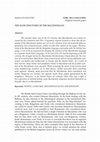
The constant claim, even in the 21 st century, that Macedonians are a nation invented by the Comi... more The constant claim, even in the 21 st century, that Macedonians are a nation invented by the Comintern and Tito's Yugoslavia requires research to show that the formation of the Macedonian nation was not at all a solution of an international leftist organisation , but a natural process, similar as with other nations in the region. The proximity of the Macedonian with the Bulgarian language, and partly with the Serbian language , is not at all an argument for denying the existence of the Macedonian language as a separate South Slavic language. At the end of the 19 th and the beginning of the 20 th century, the struggle led by the Macedonian Revolutionary Organisation for the creation of an autonomous Macedonian state aroused great interest among diplomats, politicians , journalists and intellectuals in Europe and the United States. As a result of that interest, many studies and pamphlets related to Macedonia and the possible solution of the Macedonian issue emerged. While seemingly the theses of the sciences from some neighbouring countries are in their favour, careful researches show something quite opposite. Namely, many perceived that the Macedonian Slavic population was neither Bulgarian nor Serbian, but separate South Slavic people appropriated by the neighbours. Moreover, in the United States, for example, where there was a right to free expression of national feeling, some Macedonian emigrants declared themselves as they felt, that is, as Macedonians.

ДРЖАВА И ИМПЕРИЈА Зборник на трудови од Шестиот меѓународен симпозиум „Денови на Јустиниjан I“, Охрид, Ресен, 23-24.11.2018, 2019
After the establishment of the new Greek state in 1830, the
Greeks looked into the past as a mode... more After the establishment of the new Greek state in 1830, the
Greeks looked into the past as a model for creating of their identity which did not exist before. However, there were two different ideal types for tracing of their origins. The supporters of the ancient Hellenic ideology sought to shape the identity of the new Greek state within the framework of the ancient Hellenic ideal by denying and excluding the Byzantine and Ottoman past form the newly projected modern Greek identity. Thus, the clash between the Hellenic way of interpreting the Greek past and the Romeic was inevitable. The tensions between the Hellenic and Romeic models was reflected in the distinction between katharevousa and demotic Greek language. Here we are examining the tensions between the two mutually opposed forces in the cultural and linguistic field. The rift between these two concepts exists even today despite the fact that the wast majority of the Greeks affiliated themselves with the Ancient Greek tradition.
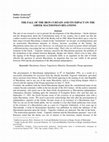
http://pf.ukim.edu.mk/lawreview/, 2020
The aim of our research is not to present the development of the Macedonian-Greek relations and t... more The aim of our research is not to present the development of the Macedonian-Greek relations and the disagreement about the Constitutional name of our country, but to point out that the conflict existed even before the fall of the Berlin wall in 1989. Main Greek thesis up to a day for their stance towards Macedonia, is based on the "irredеntism" on our part, on stealing history and on nonexistent Macedonian minority in Greece, because, according to the Greeks, the Macedonian nation does not exist. However, we will point out several occasions which will paint a different picture concerning the one we know today. That's why we will focus at several critical moments in the Greek-Yugoslav relations caused by the Macedonian question, the problem of the irredentism in the relation between Belgrade, Skopje and Athens, which even to date, after the signing of the Prespa agreement, occasionally drifts as an argument on the side of Greek officials the question of ancient Macedonia, an argument that was not visible in the period between 1944 and the proclamation of the Macedonian independence.

The Byzantine Missionary activity and its legacy in Europe, 2017
The creation of the Modern Greek state in 1830 meant the
beginning of the building of a new ident... more The creation of the Modern Greek state in 1830 meant the
beginning of the building of a new identity in the Balkan region. Greek
population, as well, the rest of the Balkans did not have developed ethnic
consciousness. Some of the Greeks considered themselves as Romeion,
some as the Greeks, and the rest one as Hellenes. Politicians and the
intellectuals of the newborn Greek kingdom had been under strong
influence of the western progressive ideas. So, taking into the account the
behavior of the western intellectuals to the Byzantine past, it was quite
understandable that there was no room for Byzantium to be a part of the
Greek national identity, at the very early times of its creation. However,
the speech of Ioannis Kolettis in 1844 and his introducing of Megali idea,
has changed the approach of the Greek intellectuals towards the Byzantine
past. Although the most prominent Greek intellectuals, Konstantionos
Paparrigopoulos or Spyridon Zambelios, for example, at the early phase
of their works had not considered Byzantium as a part of the Modern
Greek identity, they changed their views under the influence of Kolettis’s
speech. Byzantium became an unavoidable part of the Modern Greek
identity.
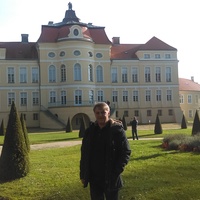









Uploads
Papers by Dalibor Jovanovski
the word. Mowrer wrote that the meaning of the word “Balkanization” is a
creation for the region hopelessly mixed races of a medley of small states
with more or less backward populations, economically and financially weak,
covetous, afraid, a continual prey to the machination of the Great powers and
to the violent prompting of their own passions.
Greeks looked into the past as a model for creating of their identity which did not exist before. However, there were two different ideal types for tracing of their origins. The supporters of the ancient Hellenic ideology sought to shape the identity of the new Greek state within the framework of the ancient Hellenic ideal by denying and excluding the Byzantine and Ottoman past form the newly projected modern Greek identity. Thus, the clash between the Hellenic way of interpreting the Greek past and the Romeic was inevitable. The tensions between the Hellenic and Romeic models was reflected in the distinction between katharevousa and demotic Greek language. Here we are examining the tensions between the two mutually opposed forces in the cultural and linguistic field. The rift between these two concepts exists even today despite the fact that the wast majority of the Greeks affiliated themselves with the Ancient Greek tradition.
beginning of the building of a new identity in the Balkan region. Greek
population, as well, the rest of the Balkans did not have developed ethnic
consciousness. Some of the Greeks considered themselves as Romeion,
some as the Greeks, and the rest one as Hellenes. Politicians and the
intellectuals of the newborn Greek kingdom had been under strong
influence of the western progressive ideas. So, taking into the account the
behavior of the western intellectuals to the Byzantine past, it was quite
understandable that there was no room for Byzantium to be a part of the
Greek national identity, at the very early times of its creation. However,
the speech of Ioannis Kolettis in 1844 and his introducing of Megali idea,
has changed the approach of the Greek intellectuals towards the Byzantine
past. Although the most prominent Greek intellectuals, Konstantionos
Paparrigopoulos or Spyridon Zambelios, for example, at the early phase
of their works had not considered Byzantium as a part of the Modern
Greek identity, they changed their views under the influence of Kolettis’s
speech. Byzantium became an unavoidable part of the Modern Greek
identity.
the word. Mowrer wrote that the meaning of the word “Balkanization” is a
creation for the region hopelessly mixed races of a medley of small states
with more or less backward populations, economically and financially weak,
covetous, afraid, a continual prey to the machination of the Great powers and
to the violent prompting of their own passions.
Greeks looked into the past as a model for creating of their identity which did not exist before. However, there were two different ideal types for tracing of their origins. The supporters of the ancient Hellenic ideology sought to shape the identity of the new Greek state within the framework of the ancient Hellenic ideal by denying and excluding the Byzantine and Ottoman past form the newly projected modern Greek identity. Thus, the clash between the Hellenic way of interpreting the Greek past and the Romeic was inevitable. The tensions between the Hellenic and Romeic models was reflected in the distinction between katharevousa and demotic Greek language. Here we are examining the tensions between the two mutually opposed forces in the cultural and linguistic field. The rift between these two concepts exists even today despite the fact that the wast majority of the Greeks affiliated themselves with the Ancient Greek tradition.
beginning of the building of a new identity in the Balkan region. Greek
population, as well, the rest of the Balkans did not have developed ethnic
consciousness. Some of the Greeks considered themselves as Romeion,
some as the Greeks, and the rest one as Hellenes. Politicians and the
intellectuals of the newborn Greek kingdom had been under strong
influence of the western progressive ideas. So, taking into the account the
behavior of the western intellectuals to the Byzantine past, it was quite
understandable that there was no room for Byzantium to be a part of the
Greek national identity, at the very early times of its creation. However,
the speech of Ioannis Kolettis in 1844 and his introducing of Megali idea,
has changed the approach of the Greek intellectuals towards the Byzantine
past. Although the most prominent Greek intellectuals, Konstantionos
Paparrigopoulos or Spyridon Zambelios, for example, at the early phase
of their works had not considered Byzantium as a part of the Modern
Greek identity, they changed their views under the influence of Kolettis’s
speech. Byzantium became an unavoidable part of the Modern Greek
identity.